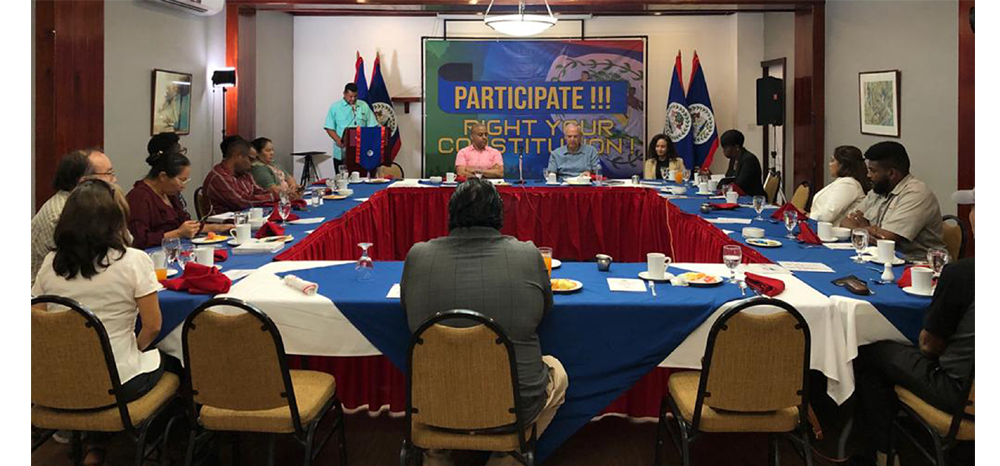Photo: PCC lecture series and breakfast with media houses
by Kristen Ku
BELIZE CITY, Tues. Sept. 12, 2023
On Tuesday, September 12, at the Biltmore Plaza Hotel, the People’s Constitution Commission (PCC) hosted an educational lecture and breakfast for media members in which it delved into the topics of Freedom of the Press, Censorship, and the Belize Constitution.
Over the past months, the PCC has held numerous engagements with society’s stakeholders, including The Churches of Belize on June 22, BDF soldiers on August 11, the Kolbe Foundation (Hattieville Prison) on July 21, and organizations like the Ministry of Education and the Belize National Teachers Union (BNTU) on August 25th and 28th. The events featured guest speakers included attorneys Darrell Bradley and Richard “Dickie” Bradley.
In the Belize District, a hub for media, PCC zone leader Maria Zabaneh was accompanied on the panel by chairman Anthony Chanona, media commissioner Louis Wade, and guest speaker, attorney Darrell Bradley. Wade emphasized the significant role that the media has played in national education and the PCC’s decision to invite the media houses for this lecture series.
“The decision was made several months ago to take the country and divide it into four zones. Each zone could have different types of events to meet the needs of the specific areas of the country. And so, we decided that this would be a great opportunity to meet the media and to hear personally from both representatives and individuals within the media itself, the areas that they would like to see improved,” he noted.
Roughly eight media houses, spanning radio, TV, social media, and newspapers, attended this focused gathering. The discussion centered on Chapter 2, Section 4 of the Belize Constitution, which addresses the “Protection of our Fundamental Rights and Freedoms.”
A pressing concern raised was the absence of explicit rights for the media within the constitution. This omission has led to uncertainties surrounding the protections journalists are entitled to and their access to information.
Comparing it to constitutions from the US, Canada, and the UK, presenter Darrell Bradley emphasized the significance of media as democracy’s fourth pillar, highlighting the need for its rights and protections.
“If you look at the constitution for the United States and the human rights law in Canada, even common law cases in the United Kingdom, they mention an expressed right to media and press freedom. Just dropping a reference like that in the Belize constitution could go a long way to redressing any imbalance and to underscore the important role that media plays as the fourth estate, as being the fourth guardian of democracy,” he stated.
Laws like the Sunshine Act or Open Meetings Act from these countries, where its primary function is to ensure that decisions regarding the federal government that affect the public are open and accessible to the public, were highlighted for their commitment to transparency. It was suggested that perhaps a “Freedom Act” is Belize’s way forward to ensure that government remains transparent.
Bradley also touched upon the barriers that the media faces from governmental figures in conducting interviews and accessing information, and noted the media’s crucial role in holding the government accountable.
“We have these practices in our society because people accept them; and if we can say, ‘No, that is wrong, you cannot limit the access of the media to information, access of the media to individual politicians, you have to answer because this is part of the democratic culture, this is how we advance principles of accountability and transparency. This is a fundamental thing within our society, and we educate people, we talk to people.’ If we can’t pass specific laws on that, we need to have more education campaigns, we need to have more training on governmental persons,” explained Bradley.
The session also delved into broader challenges and dangers journalists face, and potential strategies to promote transparent governance in Belize.

